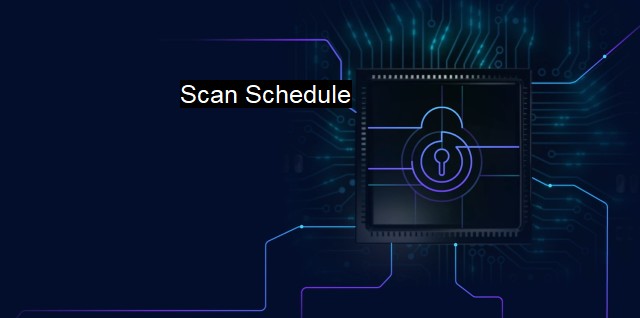What is Scan Schedule?
Why Antivirus Scan Schedules Matter: Protecting Your Computer from Cyber Threats
"Scan Schedule" in the cybersecurity and antivirus context refers to the automated process where a computer system rigorously checks for, identifies and halts potential risks, threats and vulnerabilities. Scan schedules are a vital component of any effective antivirus software, offering regular and systematic scans to ensure optimal system functionality.The primary task of scan scheduling is to minimize the attack surface of any potential threats that could infiltrate the system. Cybersecurity threats such as malware, spyware, Troglodytes, ransomware, worms, trojans, rootkits, keyloggers, rogue security software, and other malicious programs are incessantly evolving and pose detrimental complications. Timely scan scheduling helps combat a wide range of such cyber assaults by detecting and eradicating them before they can unveil their damaging implications.
Scan schedules imply setting up a specific time and frequency for automatic scanning. The scan time can be set to execute at times when the system is not over-encumbered, for instance during the user's customized idle or off-peak time. The frequency determines whether these system scans take place daily, weekly, or an entirely different specified frequency. Frequently updated and scanned systems drastically reduce the spar of vulnerabilities that malware can exploit.
There are various types of scans, each differing in detail and completion time. A full system scan is the most comprehensive, scanning every file and application on the computer. While extremely thorough, this type of scan might take a while to complete. A quick scan or an on-demand scan is a faster alternative, scanning specific locations that hackers often target. Custom scans provided by many software allow users to direct their focus towards specific suspicious files or folders for a quick diagnosis. The respective target surfaces for these scans vary vastly- while a full scan aims at the bigger picture, a quick scan sustains regular upkeep, and a custom scan enables personalized scrutiny.
Keeping the computer system vigorously updated helps in confronting incoming novel threats. Security vendors typically release novel antivirus definitions each day, making regular updating scanners for guarding against the latest threats crucial. Many users opt to take their updates mechanically, and the antivirus software respects that recall to run these updates during the scan.
Scan Schedules run most efficiently while running cloud-based applications. Besides providing on-the-go mobility usage and real-time synchronization, cloud applications pose lesser threat due to their off-premise nature. Even then, it's not entirely 'hack-proof' - the implications of a breach can be disastrous, with sensitive data compromised. Hence, antivirus scanners need to be incorporated during the development phase, which vets security matters prior to code deployment that, too, is scheduled repeatedly to further bolster security measures.
Undeniably, scan schedules should be defined as part of a broader cybersecurity strategy that includes security awareness training, password management protocols, regular software updates, data encryption, and robust recovery schemes among others. Therefore, scan scheduling is an effective preventive procedure in the larger cybersecurity overview, designed for threat detection in a timely manner with effective resource utilization.
Scan scheduling is a crucial aspect of cybersecurity. Effective cybersecurity isn't just about defying or extinguishing the attack; it convincingly revolves around expecting and preparing for it. A system armed with an efficient scan schedule is well prepared, enabling it to combat and surmount any unlikely situation that threatens the user's data-defense. So, while many might trivialize scan scheduling as just timely scanning, its implications run far more profound in securing a system's foundations against the constantly unfolding cybersecurity threats.

Scan Schedule FAQs
What is a scan schedule in cybersecurity?
A scan schedule in cybersecurity refers to the pre-defined scanning frequency to check for any vulnerabilities in your system or network. It is usually set up in antivirus software to protect against potential threats or attempts at cyberattacks.How do I set up a scan schedule in my antivirus software?
The process may vary depending on the specific antivirus software you are using, but most will have an option to set up a scan schedule in the settings or preferences menu. You can choose the scan type, frequency, and time for the scan. We recommend setting up a regular scan schedule to ensure constant protection against possible threats.What are the benefits of having a scan schedule in antivirus software?
A scan schedule in antivirus software helps to prevent any potential threats by detecting and removing any malware or viruses on your system. It also helps to keep your software up-to-date and efficient in detecting new threats. Regular scanning is critical to maintain a healthy and secure system, and a scan schedule ensures that this happens on a consistent basis.Is it necessary to have a scan schedule in antivirus software installed?
Yes, having a scan schedule in antivirus software is crucial to maintaining a secure system. It helps to detect and remove any malware or viruses that could harm your system or data. Regular scanning is necessary to stay protected against new threats that may arise, and having a scan schedule ensures that this happens without any manual effort. Therefore, it is highly recommended to set up a scan schedule in your antivirus software to protect against potential cyberattacks.| | A | | | B | | | C | | | D | | | E | | | F | | | G | | | H | | | I | | | J | | | K | | | L | | | M | |
| | N | | | O | | | P | | | Q | | | R | | | S | | | T | | | U | | | V | | | W | | | X | | | Y | | | Z | |
| | 1 | | | 2 | | | 3 | | | 4 | | | 7 | | | 8 | | |||||||